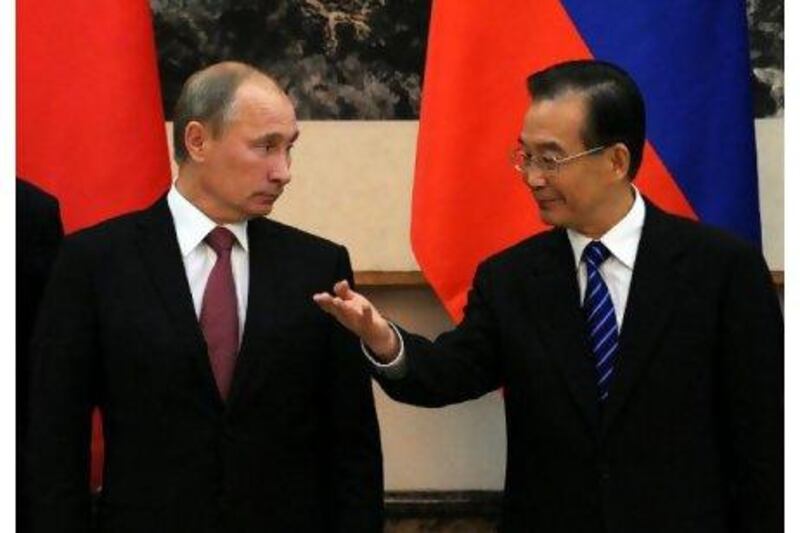BEIJING // Russia's prime minister, Vladimir Putin, arrived in China yesterday for a two-day visit as a stalemate continues over the cost of gas Russia is due to pump into China through a new pipeline project.
At the start of talks yesterday with his counterpart, Wen Jiabao, in the Great Hall of the People, a communist edifice beside Tiananmen Square, Mr Putin indicated the two sides were hopeful for progress in the pipeline negotiations. Up to 68 billion cubic metres of Siberian gas could flow into China, the world's most populous nation, through two lines, although the project's hoped-for starting date of 2015 is likely to be delayed.
"Those who sell always want to sell at a higher price, while those who buy, want to buy at a lower price. We need to reach a compromise which will satisfy both sides," the Russian prime minister said. He added that "in political, humanitarian spheres we have no problem at all" and the countries had "reached unprecedented levels of cooperation".
"As far as the as the economy and trade are concerned, issues of pragmatic nature are being resolved, and this is good," he said.
China's success in developing energy alliances with countries in the Middle East and Central Asia has increased the country's bargaining power in its negotiations with Russia over the Gazprom project.
An honour guard was laid on for Mr Putin yesterday, who recently announced he was seeking a return to the Russian presidency. The state news agency quoted the Chinese ambassador to Russia, Li Hui, as saying earlier this week that bilateral ties had reached "unprecedentedly high levels".
Mr Putin's visit to Beijing comes not long after Moscow announced it had arrested a Chinese man accused of trying to obtain details of a Russian missile system. This underlies irritation Russia has felt about the Chinese copying its fighter aircraft and other defence equipment.
Despite their points of contention, Beijing and Moscow have been forging diplomatic alliances recently as they seek to check the influence of the United States and other western powers.
Earlier this month, they vetoed a UN Security Council resolution condemning the crackdown on protesters by Bashar Al Assad's regime in Syria, which receives much of its arms from Russia as well as smaller amounts from China. Russia and China both voted against the resolution, while their fellow emergering market Brics countries Brazil, India and South Africa abstained.
Beijing and Moscow recently proposed a new UN Security Council resolution that criticises violence by both sides of the Syrian dispute. Yesterday the Chinese foreign ministry spokesman Liu Weimin made unusually forthright comments calling for the Syrian authorities to ensure reforms took place.
"We believe the Syrian government should move faster to honour its reform pledges and swiftly start to push forward the inclusive political process with the broad participation of all parties in Syria," he told reporters.
Last week the Russian president, Dmitry Medvedev, warned the Syrian regime it must reform or otherwise "it will have to go".
Russia and China have also been strengthening their wider economic ties. Last year China became Russia's largest trading partner, and bilateral trade is up a further 40 per cent so far this year. The 160-strong delegation accompanying Mr Putin includes many senior business executives.
Mr Putin's visit continues today with talks with Hu Jintao, the Chinese president, who is expected to step down as the Communist Party's general secretary next year ahead of relinquishing the presidency in 2013, a leadership transition that is also set to see Mr Wen retire as premier.






